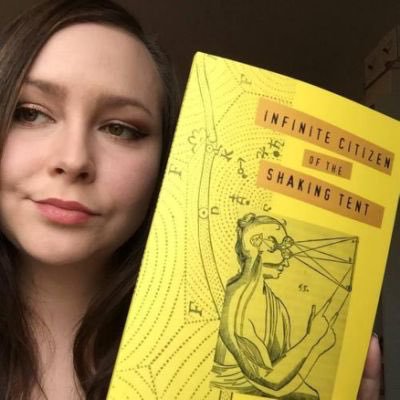
TORONTO—Liz Howard choked back tears as she accepted the $65,000 Griffin Poetry Prize on Thursday night, speaking candidly about overcoming her tough childhood and expressing hope she could be an example to First Nations youth facing personal struggles.
The northern Ontario writer was visibly moved as she was announced as the Canadian winner of the lucrative literary prize at a glittering Toronto gala. Howard received the honour for her debut “Infinite Citizen of the Shaking Tent” (McClelland & Stewart).
The 30-year-old lives in Toronto, but grew up in Chapleau, Ont., two hours west of Timmins.
In her acceptance speech to a hushed room, Howard acknowledged her family for making the 800-kilometre journey to support her at the gala. She also shared intimate details of a childhood coloured by intense challenges, and noted how writing was both a creative outlet and saving grace.
“My upbringing was quite difficult and impoverished,” said an emotional Howard. “When I was young, I sort of thought that, perhaps, it would be best to not exist.
“I know a lot of our youth today are struggling, especially our First Nations youth. And I guess I just wanted to say that it can get better. And for me, poetry made life possible for me. It made life tolerable for me—both reading it and writing it.
“This is a spectacular occasion. I feel like I’m having an out-of-body experience,” she added, with a gentle laugh.
Howard said her winning collection has been shaped by her entire life, growing up in a small, isolated town, estranged from her First Nations father, and not fully knowledgeable about her identity. She is biracial and of Anishinaabe heritage.
Howard said her poetry also reflects moving to the city, studying science, and being in an urban environment, while also trying to educate herself about First Nations cosmology and philosophy.
American judge Tracy K. Smith praised Howard for her “bold” debut collection. Smith added that Howard’s work assured her of poetry’s ability to “have at the real…the messy (and) befuddling matter of being and staying human.”
The U.K.’s Alice Oswald and Canada’s Adam Sol rounded out the Griffin Poetry Prize jury who selected the finalists from 633 books of poetry from 43 countries, including 25 translations.
Vermont-born Norman Dubie won the international prize, also worth $65,000, for “The Quotations of Bone” (Copper Canyon Press).
Michael Wiegers, Dubie’s publisher and editor, accepted the award on behalf of the ailing writer who did not attend the ceremony.
Wiegers noted that Dubie—who has been writing for about a half-century—actually had taken a 10-year “vow of silence” where he took a break from the craft.
“This award is just such an affirmation of his work and being recognized again,” Wiegers said in an interview following the ceremony.
“It’s almost like he’s starting anew,” he added. “(In) each of his collections I think he has a very distinctive voice, but in this case… it’s completely unpredictable.
“You don’t know who’s speaking, and oftentimes, there are many voices speaking within the collection. I think that his capacity to enter into any space, any voice, is just taken up to another degree in this collection.”
Wiegers said that Dubie is a long-term practising Tibetan Buddhist, and that his poems are “filled with great compassion for others.”
“He’s a master at looking into history and giving personality to great figures from history. In this collection in particular, I think he spans the world in his compassion.”
The Griffin is billed as the world’s largest prize for a first-edition single collection of poetry written in or translated into English. Toronto businessman and philanthropist Scott Griffin created the honour along with trustees including writer Michael Ondaatje.
In addition to the grand prize winners, each finalist also receives $10,000 for participating in Wednesday evening’s readings at Toronto’s Koerner Hall.
The Canadian finalists also included Toronto’s Soraya Peerbaye for “Tell: poems for a girlhood” (Pedlar Press) and “Frayed Opus for Strings & Wind Instruments” (Brick Books) by Swedish-born Danish poet Ulrikka S. Gernes and translated by Canadian collaborators Per Brask and Patrick Friesen.
The international short list also included “Conflict Resolution for Holy Beings” by Joy Harjo (W. W. Norton & Company), “40 Sonnets” by Don Paterson (Faber and Faber) and “Heaven”’ by Rowan Ricardo Phillips (Farrar, Straus and Giroux).